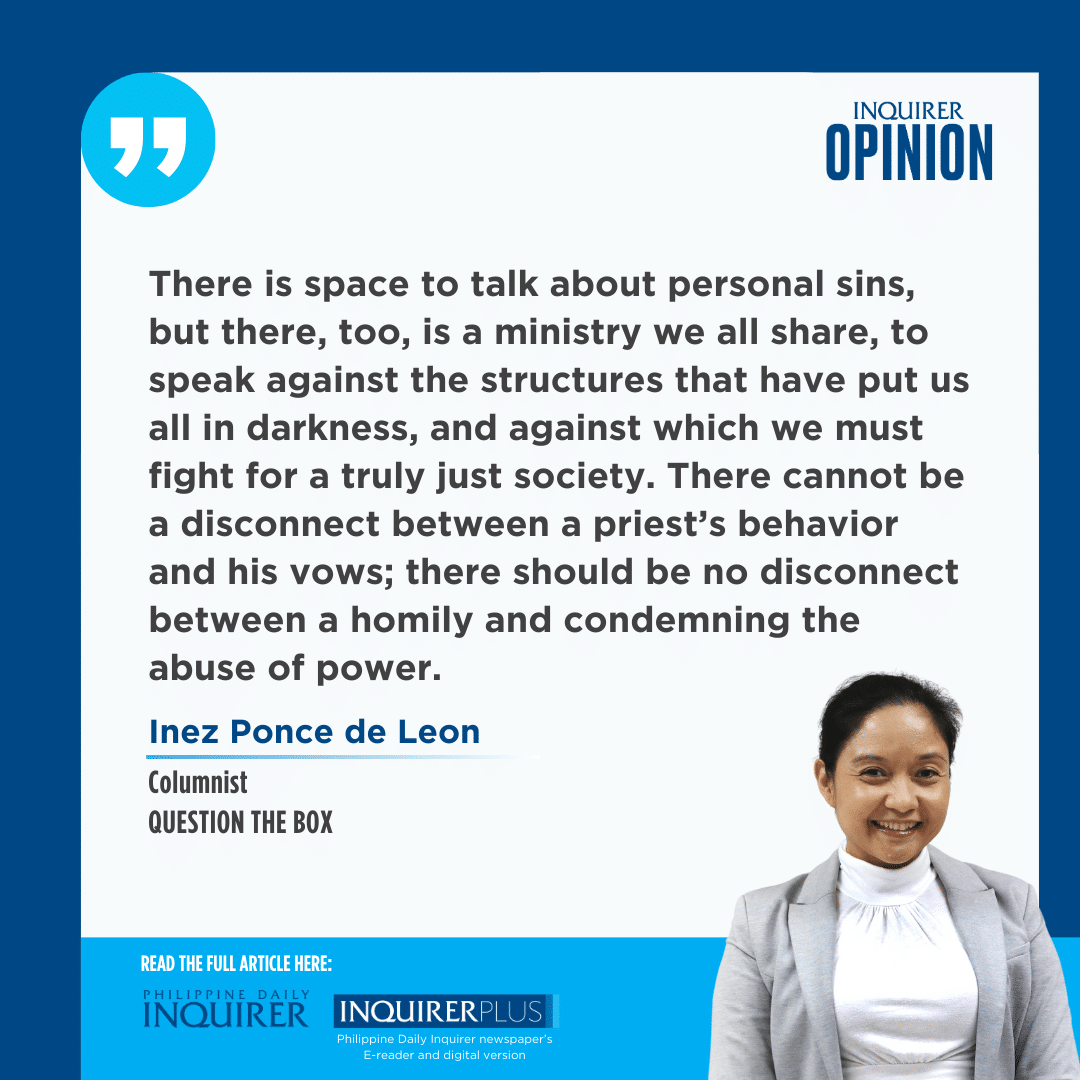To preach without fear
Two Sundays ago, I served as lector at my parish, and was pleasantly surprised to find that our guest presider was a Jesuit: Fr. Carlo Lacang, whose ordination Mass I had attended years ago.
The Gospel was about the blind man who asked Jesus to return his sight. Father Lacang’s homily was one of the most piercing I had ever witnessed. He ended his reflection with the notion that we must all carry our own light in this time of great and increasing darkness.
We had to shine the light, he said, on the darknesses of injustice, ignorance, and indifference. We had to fight for the wrongly incarcerated, help those who suffered in the storms, speak to those who voted based on popularity rather than principle.
My fellow lector remarked that Jesuits often “got political” with their homilies. I told her that it was the hallmark of Jesuit education, regardless of year level and degree: all students are taught to go where people are and meet them in their need, to work for social justice.
The remark might have simply been an observation, but it stayed with me, then resurfaced when I recently spoke to a close friend, who is both a priest and homilist. He brought up how he had a difficult time with diocesan priests: some of them didn’t seem to take their retreats seriously and would chat with each other even while a facilitator was giving reflection points.
Some of them even shared information with each other on cruises, and loudly, at a major church event—all while a church official was speaking.
I brought up my fellow lector’s words, which steered our discussion toward priests who gave homilies that were simply feeble attempts at humor, or that pounded people with the idea that they were hopeless sinners, or that were long, and yet said nothing.
I’m lucky: all the priests in my parish give good homilies, but I’ve also heard homilies that made people sleep, visibly cringe, or resort to scrolling through social media on their cellphones.
My friend gave examples of good homily approaches from his work. For instance, he starts his homilies from everyday objects and occurrences, such as zebras, to show the balance of the Virgin Mary’s roles. By extension, he would have brought up Senate hearings or guidelines in voting for the right leaders if the Gospel and current events called for it.
There was no distinction between the pedestrian and political, he said, especially when both the government and the church are concerned with the people’s well-being. If the government is standing in the way of that well-being, then shouldn’t the church speak up? If the government itself perpetrates injustice, then shouldn’t the church also call it out?
It went back, he said, to the Ignatian idea of finding God in all things, which also means helping people to see God even in the unexpected, the ignored, the everyday. For if we cannot make people see God in everything they do, then how will they find God when they leave the church? How can they see God in others? How can they relate their faith to their everyday lives?
It’s something that has frustrated me, indeed, for years, when some priests refuse to criticize the government because they don’t want to appear political. This, however, confuses the idea of “politics” with “government.” Politics is about power, and power must always be examined, interrogated, criticized.
To reduce homilies to talking about personal sins is to ignore the larger systems in place that enable such sins to occur. Theft? Why would thieves be afraid if government officials can get away with pocketing billions of pesos? Murder? Why would killers be afraid if a foulmouthed president was elected on a platform of bloodshed? Adultery? Why would cheaters be afraid if cheaters are ignored, even elected?
Yes, there is space to talk about personal sins, but there, too, is a ministry we all share, to speak against the structures that have put us all in darkness, and against which we must fight for a truly just society. There cannot be a disconnect between a priest’s behavior and his vows; there should be no disconnect between a homily and condemning the abuse of power.
Some might say that Jesus was personal, not political. At them, I throw theology, a reading of the Gospels against history, and Father Lacang’s homily, which he began with the idea of Jesus asking the blind man what he wanted.
The society of that time cast out the blind, deaf, and crippled. They had no choices. They were less than human. By asking the blind man what he wanted, Jesus returned the man’s agency—his humanity.
Jesus’ words were not always about the people themselves, but subtly criticized the structures that people had allowed to imprison and blind them, the so-called standards that had created outcasts in a society that had forgotten kindness. To ask the blind man what he wanted, and to return the man’s sight, was an act of rebellion.
We cannot call ourselves followers of Jesus if we are so scared to speak up against injustice, and if we are so afraid to rebel.
—————-
iponcedeleon@ateneo.edu

















